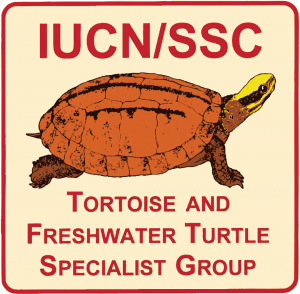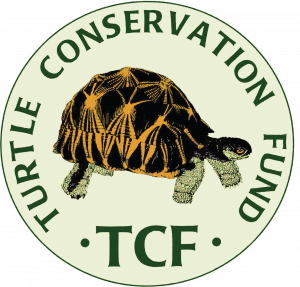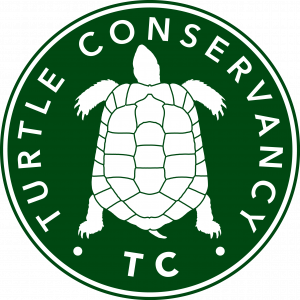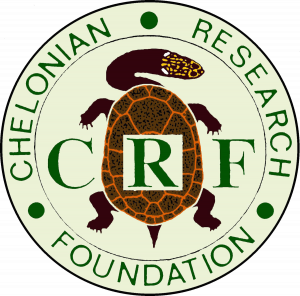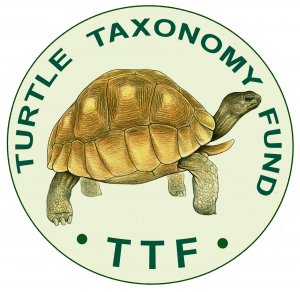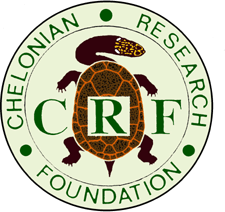Turtle Taxonomy Fund
Turtle Taxonomy Fund
at Chelonian Research Foundation
and Turtle Conservancy
Donate to the Turtle Taxonomy Fund
TTF Coalition Partners:
Chelonian Research Foundation • Turtle Conservancy • Re:wild
Andrew Sabin Family Foundation • IUCN/SSC Tortoise and Freshwater Turtle Specialist Group
Executive and Review Board:
Anders G.J. Rhodin, M.D.
Co-Chair ([email protected])
Chelonian Research Foundation, Arlington, Vermont, USA
Turtle Conservancy, Ojai, California, USA
John B. Iverson, Ph.D.
Co-Chair ([email protected])
Earlham College, Richmond, Indiana, USA
Dr. Uwe Fritz
Museum für Tierkunde, Senckenberg Dresden, Germany
Natalia Gallego-García, Ph.D.
Wildlife Conservation Society, Cali, Colombia
University of California, Los Angeles, California, USA
Arthur Georges, Ph.D.
Institute for Applied Ecology, University of Canberra, Australia
Dr. Flora Ihlow
Dresden University of Technology, Dresden, Saxony, Germany
Russell A. Mittermeier, Ph.D.
Re:wild, Austin, Texas, USA
H. Bradley Shaffer, Ph.D.
University of California, Los Angeles, California, USA
Peter Paul van Dijk, Ph.D.
Re:wild, Austin, Texas, USA
Turtle Conservancy, Ojai, California, USA
The Turtle Taxonomy Fund (TTF) was established as an endowment fund in March–April 2021 at Chelonian Research Foundation (CRF) and Turtle Conservancy (TC) through initial founder donations and commitments from Anders Rhodin, John Iverson, Eric Goode, Andy Sabin, Justin Congdon and Nancy Dickson, Martin Dieck, Matt Frankel, Brett Stearns, George Meyer and Maria Semple, Russ Mittermeier, Peter Paul van Dijk, Uwe Fritz, Julian Sands, Craig Stanford, Arthur Georges, and Rick Hudson. Inaugural TTF Coalition Partners with CRF and TC were Global Wildlife Conservation (now rebranded as Re:wild), Andrew Sabin Family Foundation, and IUCN/SSC Tortoise and Freshwater Turtle Specialist Group. All these founders are gratefully acknowledged and warmly thanked.
TTF awards grants to individuals for specific taxonomic and phylogenetic research projects dealing with freshwater turtles or tortoises, but not marine turtles, with either partial or full support as funding allows.
TTF provides support primarily for academically-oriented taxonomic and phylogenetic research on systematic diversity and phylogeographic relationships of freshwater turtles and tortoises, notably for poorly known or widespread taxa or other prioritized or targeted species or taxa as determined by its Board. Research projects focused on defining evolutionarily distinct or disjunct lineages that might require nomenclatural recognition and/or other taxonomic clarification are especially sought. Proposals may also address taxonomic or population genetic topics that are pertinent to the conservation status or needs of the taxa involved.
Applicants are encouraged to pursue multipronged methodological analyses, preferentially combining molecular genetics (mitochondrial DNA, nuclear DNA, Rad-Seq, whole genomics, etc.), comparative morphology (phenotypic and skeletal), morphometrics, and detailed evaluations of distributional patterns. Projects focused on collecting field data and samples, in collaboration with research groups or labs with the capacity to carry out the genetic analyses, are particularly encouraged.
Applicants are encouraged to utilize a combination of targeted non-destructive molecular genetic sampling of living specimens (wild or captive) and/or preserved museum specimens (e.g., ancient DNA and/or type material) from known localities and supplementary judicious use of available GenBank sequences and similar resources. Many high-throughput molecular genetic data pipeline laboratories, such as those at UCLA (Shaffer), Senckenberg Dresden (Fritz), and Canberra (Georges), as well as many others, often welcome collaboration with field sample collectors and other researchers; sample sharing with such labs under appropriate regulatory protocols is strongly encouraged, but not required.
Use of curated specimens in museums and other collections is also encouraged for analysis of comparative morphology, morphometrics, and distributional data. Utilizing large, high-diversity turtle collections is especially encouraged (e.g., the Peter Pritchard Collection of Chelonian Research Institute at Turtle Conservancy in Ojai, California, the Museum of Comparative Zoology at Harvard, the United States National Museum at the Smithsonian, the California Academy of Sciences in San Francisco, the American Museum of Natural History in New York, the Carnegie Museum in Pittsburgh, Field Museum in Chicago, Florida Museum of Natural History in Gainesville, University of Michigan in Ann Arbor, University of Utah in Salt Lake City,, Los Angeles County Museum, Senckenberg Museums in Dresden and Frankfurt, Muséum National d’Histoire Naturelle in Paris, Natural History Museum in London, and other leading museums in Berlin, Munich, Vienna, Leiden, São Paulo, Rio de Janeiro, Manaus (CEQUA), Buenos Aires, Canberra, Sydney, Perth, South Africa, Colombia, India, Indonesia, Thailand, China, Russia, Sweden, and elsewhere).
The maximum amount of each grant at this time is US $10,000, but smaller grant requests of $5,000 or less are strongly encouraged to support pilot studies or other focused taxonomic and phylogenetic research initiatives, and are more likely to receive funding. At this time, the Fund solicits proposals twice annually and provides grants of ca. $3,000 to $10,000 each. As additional resources are secured and the endowment grows, the Fund will consider and announce possible options for more funding cycles annually.
Who Can Apply
Applications will be considered from any individuals, with funding decisions based on equitable peer-review and treatment of applicants and their proposals without bias. A single principal investigator (P.I.) must be identified, but co-P.I.(s) are encouraged.
How to Apply
Application proposals must include a cover page followed by a detailed project description, providing summarized background of previous relevant work and objectives and justification for the planned work, including its relevance, precise methodology, literature citations, and anticipated timeframe for the work, budget and justification, including funding requested or committed from other sources, and the CVs of the lead applicants.
At this time, there are two grant cycles annually, with application deadlines of
June 1 and December 1
and funding determinations by about
July 31 and January 31
Applications should be sent to
Anders G.J. Rhodin and John B. Iverson
• A standardized cover sheet (DOWNLOAD Cover Sheet HERE) must accompany each application and must include details about the project and the P.I.(s), the total planned project expenses, the amount requested from TTF, grants requested or secured from other sources, and the taxa being investigated.
• The project description should include the following headings: Executive Summary (less than 400 words), Introduction, Objectives and Hypotheses, Methods and Materials (be specific about molecular genetic and/or morphological methodology and source of specimens), Expected Significance of the Research Outcome (important), Budget and Timeline, and Literature Cited. The budget and its justification need to explain how funds would be used and over what time period (citing planned start and end dates).
• For the P.I. and co-P.I.(s), include short C.V.(s) (10 pages at most) including educational and professional background, current organizational affiliation(s), positions held, relevant publications, prior grant funding awarded, and any other pertinent information.
Review and Funding Process
All grants will be reviewed by the TTF Review Board, which is composed of six members of the Turtle Taxonomy Working Group (TTWG), co-authors of Turtles of the World: Annotated Checklist and Atlas of Taxonomy, Synonymy, Distribution, and Conservation Status (Rhodin, Iverson, Fritz, Georges, Shaffer, and van Dijk), as well as three other turtle taxonomy specialists (Gallego-García, Ihlow, and Mittermeier).
TTF prioritizes funding based on the reviewer-assessed validity, quality, and perceived benefits of the taxonomic and phylogenetic research proposed as compared to prior documented research and relevant needs, the methodological quality and probable feasibility of the proposed work, and the apparent experience and qualification(s) of the investigator(s). TTF does not prioritize funding based on gender, ethnicity, or nationality of applicants, and such details are not required or requested.
TTF provides grants in support of direct research and expenses of selected turtle proposals and does not provide support for indirect organizational overhead expenses associated with administration of grants, and will not fund requests for such indirect costs.
Grant funds are disbursed only after completion of a signed legal contract between CRF on behalf of TTF and the responsible P.I. who will perform or supervise the proposed work, and funds will not be disbursed until any overdue or missing interim or final reports from previously supported projects are submitted and accepted.
Grantees are required to submit final reports after completion of the project and annual interim reports for those projects lasting longer than a year. All grantees are strongly encouraged to present their results at national and international scientific symposia and to publish appropriately as warranted in relevant scientific journals, notably Chelonian Conservation and Biology, the peer-reviewed scientific journal co-published by CRF and its partner Turtle Conservancy.
Donate to the Turtle Taxonomy Fund
Donors and Supporters of the Turtle Taxonomy Fund
TTF Funded Proposals
2021–Present
20 proposals received, 12 funded
$75,511 granted
Caccone, Adalgisa and Jensen, Evelyn. 2023. Whole genome sequencing to clarify the taxonomy of the extinct population of Galapagos tortoises from the island of San Cristobal and the taxonomic rank of all Galapagos taxa. Yale University, New Haven, Connecticut, USA, and Newcastle University, Newcastle on Tyne, United Kingdom.
Ihlow, Flora and Fritz, Uwe. 2023. Clarifying the identity of historical collection material of Snail-eating Turtles of the genus Malayemys using a combination of fresh genetic samples and ancient DNA. Museum of Zoology Senckenberg Dresden & Computational Landscape Ecology TU, Dresden, Germany.
Deepak, Veerappan and Fritz, Uwe. 2022. Taxonomy of the Asiatic giant softshell turtle (Pelochelys cantorii sensu lato). Senckenberg Natural History Collections, Dresden, Germany.
López-Luna, Marco A., Escobedo-Galván, Armando H., and Rangel-Mendoza, Judith A. 2021. Assessment the taxonomic status of the Mud turtles (Kinosternidae: Kinosternon) in Western Mexico. Universidad Juárez Autónoma de Tabasco, Villahermosa, Tabasco, Mexico.
Jensen, Evelyn and Caccone, Adalgisa. 2021. Whole genome sequencing to clarify the taxonomy of the Santa Fé Island giant Galapagos tortoises. Newcastle University, Newcastle Upon Tyne, United Kingdom.
Wichman, Dylan J., Apodaca, Joseph J., Bowers, Brandon C., Hollender, Ethan C., McKnight, Donald T., Thompson, Denise M., and Ligon, Day B. 2021. A three-dimensional view: natural history, phylogenetic analysis, and advanced morphology of the Western Chicken Turtle, Deirochelys reticularia miaria. Missouri State University, Springfield, Missouri, USA.
Brown, Grover J. and Pierson, Todd. 2021. Clarification of the murky evolutionary history of southeastern Mud Turtles (genus Kinosternon) using a phylogenomic approach. Jacksonville State University, Jacksonville, Alabama, USA.
Reyes-Grajales, Eduardo and Matamoros, Wilfredo A. 2021. Integrative taxonomic evaluation of the Trachemys venusta (Gray 1856) complex in Mexico. El Colegio de la Frontera Sur, Chiapas, México.
Krueger, Caleb and Janzen, Fredric. 2021. Development of a range-wide genetic dataset to enable conservation of Clemmys guttata. Michigan State University, East Lansing, Michigan, USA.
Thomson, Scott A., Ferrara, Camila, and Magalhaes, Marcela S. 2021. The Red Side Necked Turtle (Rhinemys rufipes Spix, 1824): taxonomy, distribution and morphology. Centro de Estudos de Quelônios Amazônicos – CEQUA/AIHA, Manaus, Brazil.
Cunha, Fabio A.G., Andrade, Marcelo, and Sampaio, Iracilda. 2021. Description of a new species of Chelidae from Brazil. Federal University of Pará – UFPA, Belém, Brazil.
Vamberger, Melita, de Silva, Anslem, Ukuwela, Kanishka, and Karunarathna, Suranjan. 2021. One or two species? The genetic re-evaluation of the Indian black turtle Melanochelys trijuga in Sri Lanka. Museum of Zoology Dresden, Senckenberg, Germany.
